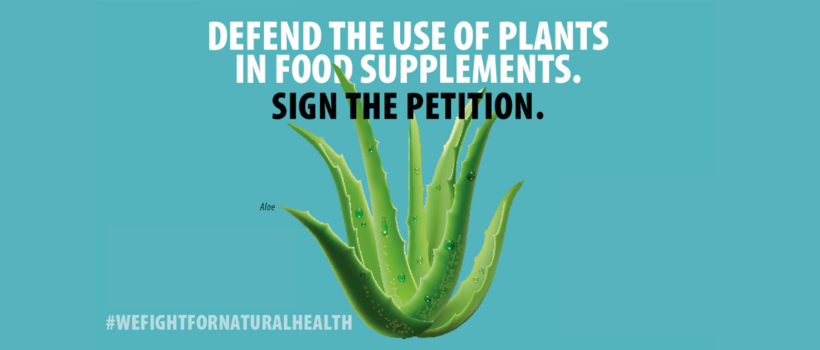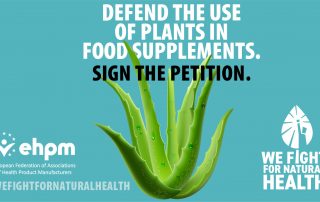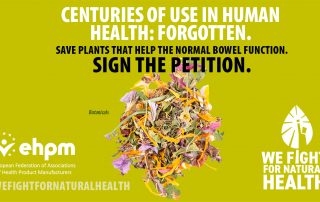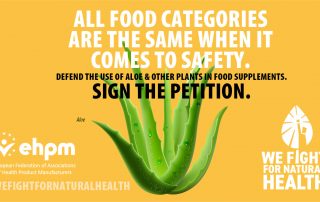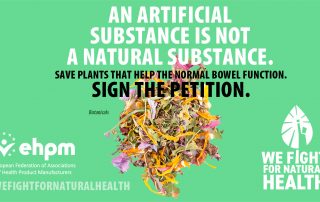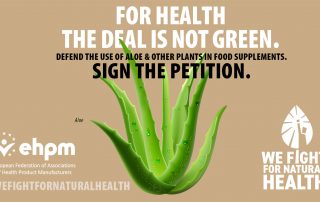We fight for Natural Health
Defend the use of Aloe and other plants in food supplements
EHPM, the voice of the Food Supplement sector, has decided to stand up and fight for Natural Health, in the interest of both the European consumers and the businesses that serve them.
Why We are Acting Now
Recently, EU Member States approved the European Commission proposal on the Aloe and other plants in foods (SANTE/10860/2018rev.1). If approved by the European Parliament, this measure would prohibit the use of Aloe and, given the uncertainty of the interpretation of the other provisions, would also put at risk the use of plants as Rhubarb, that have physiological functions such as helping the normal bowel function, in food supplements for alleged safety reasons.
In 2017, the scientific opinion of the European Food Safety Authority (EFSA) concluded that uncertainty persists due to the lack of data. In the meantime, the Commission suggested a blanket ban based on the precautionary principle. However, additional relevant studies confirming the safety of Aloe and other plants have been published recently and the Commission did not allow more time for EFSA to evaluate them.
Our Goal: Give More Time to Evaluate Safety Concerns
EHPM asks that producers get the chance to prove that their products are safe and that EFSA has the time to evaluate the most recent studies.
Therefore, we call upon Members of the European Parliament and citizens to sign this petition to ask the Commission to modify its measure allowing for more time to better evaluate the safety concerns regarding Aloe.
As a Member of the European Parliament, you can support us by objecting against the mentioned regulation in the framework of the ENVI Committee and Plenary votes.
As a consumer, you can support us by signing the petition and make your voice heard!
Sign our petition HERE!
Join our campaign: #WeFightForNaturalHealth
If the European Parliament approve the European Commission proposal on the Aloe, thousands of jobs would be lost in the EU, while thousands more will lose their jobs at production facilities around the globe. It is a measure that severely limits the use of natural substances for health and which is contrary to the principles of the European Green Deal.
That is why we count on the European Parliament to act!
We hope more and more stakeholders and politicians will support us in this fight, leading to a justified position of natural health products within the total spectrum of health related products.
Our Petition (in Full)
The desire of consumers to live a healthy life and use natural products and ingredients represents a huge opportunity for society, governments and producers to offer these often well-known natural products and ingredients in a sustainable and fair way. Unfortunately, more and more natural foods, food supplements and natural ingredients are being marginalized by regulators. Every so often, this leads to a total ban on products we have been safely using for decades. In our opinion, often due to an inappropriate approach that leads to misleading conclusions!
EHPM, the European Federation of Associations of Health Product Manufacturers, has decided to stand up and fight for Natural Health, in the interest of both the European consumers and the businesses that serve them.
Recently, EU Member States approved the European Commission proposal on the Aloe and other plants in foods (SANTE/10860/2018rev.1). If approved by the European Parliament, this measure would prohibit the use of Aloe and, given the uncertainty of the interpretation of the other provisions, would also put at risk the use of plants as Rhubarb, that have physiological functions such as helping the normal bowel function, in food supplements, for alleged safety reasons.
Why is the European Commission’s approach not appropriate?
There are EVIDENT SHORTCOMINGS in the scientific evaluation underlying the decision and recent relevant studies have not been taken into account, the procedure IS NOT TRANSPARENT and, moreover, it appears DISCRIMINATORY to the detriment of the food supplement sector only, as other sectors benefited from exceptions, e.g. medicines and beverages. In particular, THMPs, Traditional Herbal Medicines which base their effectiveness only on traditional use and not on scientific evidence!
Our Concerns
The Commission took the decision on the basis of an EFSA scientific opinion which should have evaluated the botanical as a whole. Instead the EFSA scientific opinion:
- Was based on data obtained by testing synthetic isolated substances which, among other things, contain impurities known to be toxic. That’s not good scientific practice to evaluate botanicals!
- From the toxicity data of these synthetic isolated substances, EFSA claimed the alleged danger of natural substances, without taking into account the composition of the botanical as a whole. It evaluated the toxicity of natural undefined substances by taking it for granted that an isolated artificial substance has the same toxicity as a natural substance! That’s not good scientific practice to evaluate botanicals!
Although these natural substances have always been used for human health:
- The decision is only based on in vitro and in vivo data on animals, without any clinical trialling on humans. WHY HASN’T THIS BEEN TAKEN INTO ACCOUNT?
- No real cases of toxicity in humans have ever been published that justify the proportionality of the measure. WHY HASN’T THIS BEEN TAKEN INTO ACCOUNT?
How will the Regulation be implemented? According to the main text of the Regulatory proposal submitted to the European Parliament for scrutiny? Or according to the official minutes of the Comitology meeting? In particular, we have the following concerns:
- It is understood that the measure will apply to food supplements only. If it is the case, on which bases are certain categories excluded? BETTER TO KNOW BEFORE THE PARLIAMENT’S VOTE!
- Will it apply only to products that contain preparations of Aloe and / or aloe emodin, emodin and danthron (isolated and / or synthetic) or will it be extended to all plant preparations containing traces of these substances, such as rhubarb or senna? BETTER TO KNOW BEFORE THE PARLIAMENT’S VOTE!
- The detention thresholds of the substances considered toxic is not reported in the text that will be voted upon by the European Parliament. Will it be equal to less than 1 part per million as written only in the official minutes of the Comitology meeting? BETTER TO KNOW BEFORE THE PARLIAMENT’S VOTE!
- How are we going to guarantee any threshold if no official testing methods have been indicated to allow product control? BETTER TO KNOW BEFORE THE PARLIAMENT’S VOTE!
MANY UNANSWERED QUESTIONS, TWO CERTAINTIES:
- The European Parliament will vote on the text of the Regulatory proposal, not on the official minutes of the Comitology meeting, even if these minutes include relevant aspects for the implementation of the proposal. This shows a lack of transparency and doesn’t comply with the principle of good administration.
- If the Parliament approves this Regulatory proposal:
- Consumers will be deprived of the ability to choose a number of natural products that benefit their health, which have physiological effects such as helping the normal bowel function, and a long history of safe use. These products have been used for decades without any safety problem.
- Consumers will have no choice but to use medicinal products when these are not needed, most of which are made with artificial substances.
- It will deny the political and social commitment to move towards a new sustainable era, in accordance with the EU Green Deal. All these products come from natural, sustainable sources that have a positive impact on our organism and the environment.
- It will not be an isolated case. Other foods such as fennel, green tea, etc. are already at risk.
- We fear this will be just the beginning. The way this legislation has come about has raised question marks about the inconsistent and legally questionable way the Commission has followed its own procedures. If this is the way forward, we fear that many other natural substances and plants will be treated in a similar way. One could question if in the end there would be a place for natural health in the EU at all?
Therefore, we call upon MEPs to defend Natural Health!
As a Member of the European Parliament you can support us by objecting against the mentioned regulation in the framework of the ENVI Committee and Plenary votes. As consumer, you can support us by signing the petition on Change.org and make your voice heard!



